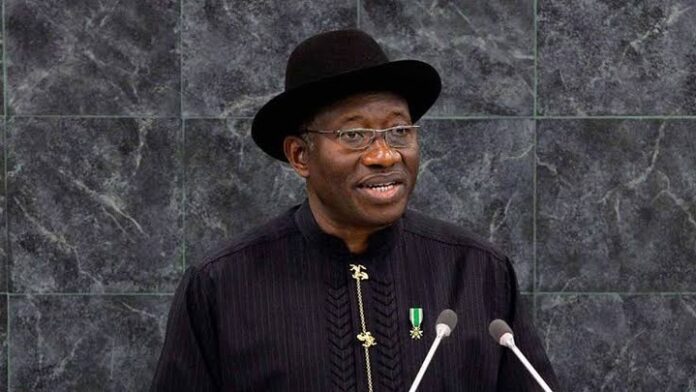Former President Goodluck Jonathan has returned to Nigeria after a tense and unexpected ordeal in Guinea-Bissau, where a sudden military takeover on Wednesday left him and other international observers stranded. Jonathan, who landed safely at the Nnamdi Azikiwe International Airport, Abuja, on Thursday, spoke openly about the experience and the efforts made to evacuate him.
Jonathan had travelled to Guinea-Bissau as part of a joint election observer mission assembled by the African Union (AU), the Economic Community of West African States (ECOWAS), and the West African Elders Forum. The team was in the country to monitor the presidential and legislative elections, which were expected to help guide Guinea-Bissau toward greater political stability after years of instability. But the situation changed dramatically when the military seized control and shut down all electoral activities.
On Wednesday, military authorities in Guinea-Bissau announced that they had taken full control of the country. They declared the suspension of all electoral processes and ordered the closure of national borders. The announcement created confusion and fear, not only among citizens but also among foreign observers who suddenly found themselves unable to leave.
Jonathan, speaking to journalists on Friday, described the tense atmosphere during the coup. He said the team of observers was taken by surprise and had to remain calm while seeking safe evacuation options. According to him, the news of the takeover spread quickly, causing panic in Bissau as citizens worried about what would follow.
The former Nigerian leader said the support he received from Nigerians back home helped him stay hopeful during the uncertain hours. “I’ve always been scared talking to the media,” he admitted, “but in this particular case, I decided to speak to the media. First and foremost, to thank Nigerians for the show of empathy, the encouragement while we were in Bissau and this so-called coup happened.”
Jonathan explained that he was informed that many Nigerians were expressing concern across social media and in the news, urging the government to ensure his safety. “The information we got was that the whole country was agitated—young and old—irrespective of religious divides or political divides,” he said. “And I sincerely appreciate Nigerians, and I want them to hear directly from my mouth, to appreciate their concern.”
Jonathan extended special thanks to President Alassane Ouattara of Ivory Coast and President Bola Ahmed Tinubu of Nigeria for their quick intervention. Both leaders, he said, immediately ordered evacuation aircraft to be sent to Guinea-Bissau.
“Both presidents were to send aircraft to lift us,” he explained, “but somehow, Ivory Coast is closer to Guinea-Bissau, and there’s always some relationship between Francophone countries, and they were able to penetrate their system to get a landing permit before Nigeria did.”
Diplomatic clearance is often required before military or government aircraft can land on foreign soil, especially during political crises. According to Jonathan, the Ivorian government was able to secure the necessary permission more quickly, allowing their aircraft to depart for Bissau before Nigeria’s.
“The Ivorian aircraft was already on its way to Bissau when we learned about the Nigerian aircraft about to depart,” Jonathan revealed. “We asked them not to bother.” He emphasized that both Tinubu and Ouattara acted promptly, and he remained grateful for their assistance.
Guinea-Bissau has experienced multiple coups since independence in 1973, making it one of West Africa’s most politically unstable countries. Elections often come with high tension, and international observers are usually deployed to help strengthen transparency and prevent violence.
Jonathan’s presence in Bissau was part of these broader efforts. As a well-respected statesman who has participated in several election monitoring missions across Africa, Jonathan plays a vital role in promoting peaceful democratic processes.
The military takeover, however, halted all progress. The junta suspended the electoral process, closed borders, and placed the country in uncertainty. Although no widespread violence was reported immediately, the abrupt power shift raised fears of instability and potential clashes.
Jonathan’s temporary entrapment drew strong reactions from Nigerians, many of whom took to social media to demand swift government action. The former president remains highly regarded for his peaceful handover of power in 2015, and many Nigerians expressed deep concern for his safety.
His calm and reassuring statements upon arrival appeared to ease public anxiety. Jonathan told journalists he believed it was important to speak directly to Nigerians to show appreciation. “I want them to hear directly from my mouth, to appreciate their concern,” he said.
The incident also highlights a larger issue in West Africa: the rising number of coups in the region. Since 2020, several countries—including Mali, Burkina Faso, Guinea, and Niger—have experienced military takeovers. This trend has put pressure on ECOWAS and other regional bodies to act more decisively.
Jonathan’s presence in Guinea-Bissau during the coup brought extra attention to the crisis. Many analysts say his evacuation underscores the need for stronger regional security arrangements to protect election observers and support peaceful transitions.
Although the situation in Guinea-Bissau remains tense, Jonathan’s safe return to Nigeria was widely celebrated. He spent time answering questions from journalists before leaving the airport, repeatedly stressing his gratitude to President Tinubu, President Ouattara, and the Nigerian people.
He also praised the collaborative efforts of the African Union, ECOWAS, and the West African Elders Forum for their commitment to promoting democracy in the troubled nation. His statements suggested that, despite the danger, he remains committed to supporting peaceful elections across Africa.
For now, Jonathan is back home, but the crisis in Guinea-Bissau is far from over. The international community is watching closely to see whether constitutional order will be restored or whether the country will sink deeper into instability.
As Nigeria and other West African nations assess the implications of yet another coup in the region, Jonathan’s experience serves as a reminder of the delicate balance between peacekeeping efforts and the unpredictable realities of political unrest.

